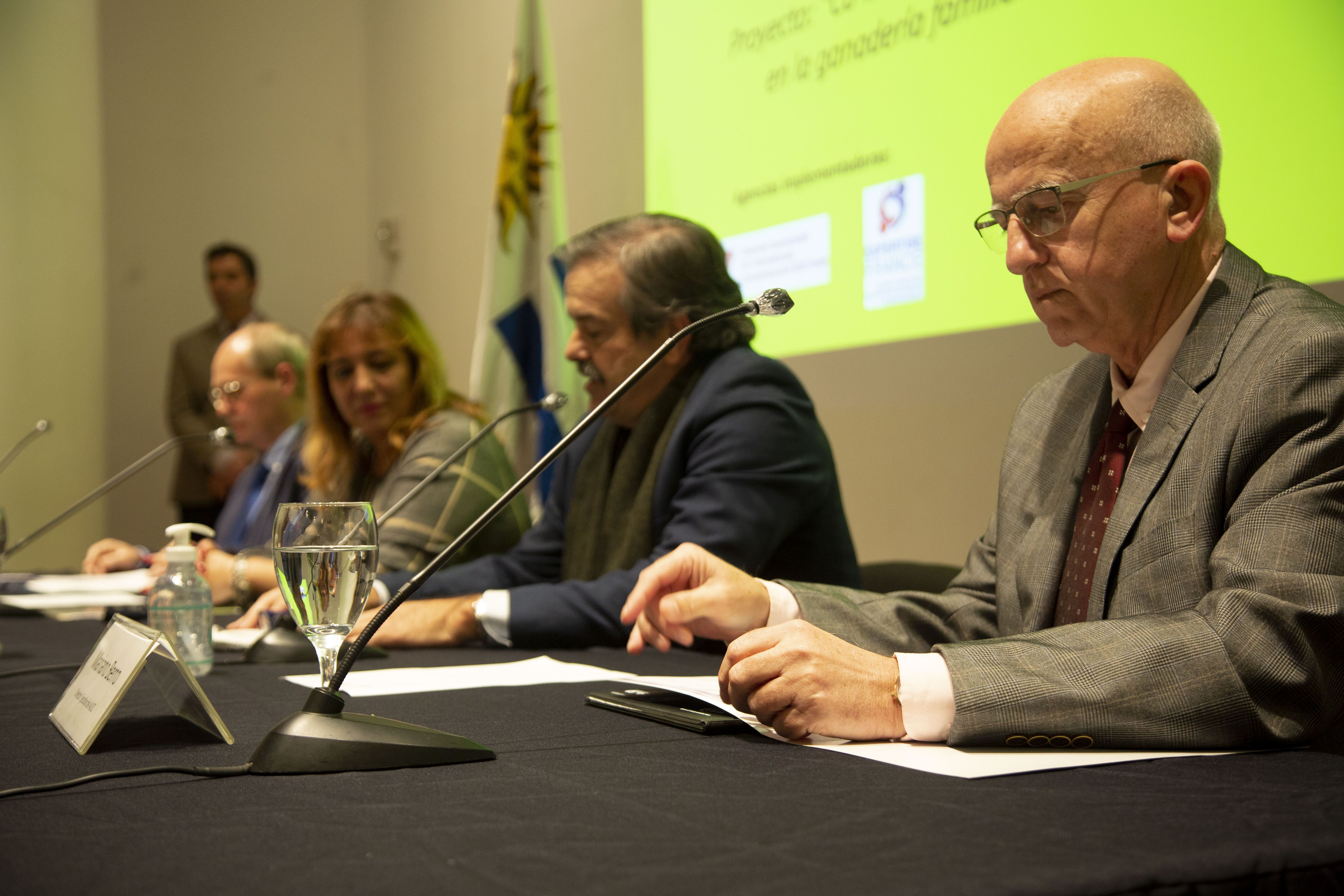The launch of the "Resilient Family Livestock Farming" project is celebrated, which is being implemented by the National Commission for
Rural Development (CNFR) together with the National
Agricultural Research Institute (INIA) of Uruguay, which is financed by the Resilient Food Production Sector of EUROCLIMA+. The event was attended by representatives of the executing institutions, authorities of the National Government, and representatives of the European Union Delegation in Uruguay.
Montevideo, July 30, 2020.
On July 30, in the Assembly Hall of the Executive Tower of the Presidency of the Republic (Montevideo, Uruguay), the official launching event for the project "Resilient Family Livestock Farming" took place.
The event started with a roundtable consisting of Mr. Fernando López, First Secretary of CNFR; Mr. José Bonica, President of INIA; Mr. Artur Brunner, representing the German Government; Ambassador Karl-Otto König, Head of the European Union Delegation in Uruguay; Mr. Carlos María Uriarte, Minister of Livestock, Agriculture and Fisheries; Mrs. Irene Moreira, Minister of Housing, Land Management and Environment; and Mr. Mariano Berro, Executive Director of the Uruguayan Agency for International Cooperation.
All panellists highlighted the reality of climate change, the importance of taking measures to adapt to and mitigate it, and how international cooperation is key in this process. Representatives from CNFR and INIA emphasised the importance of the role of organisations, teamwork, family livestock production, and natural fields as a key resource for the country.
Mr. Arthur Brumer put the GFR project in context, as one of 10 projects funded by EUROCLIMA+ in the region, which aims to accompany countries in fulfilling their Nationally Determined Contributions (NDC). For his part, Ambassador Karl-Otto Konig applauded "a project that brings civil society together with a public research institution and international cooperation”. He also stressed that the work on co-innovation brings with it participation and responsibility shared by the actors.
Minister Irene Moreira highlighted that this project is key because it is aligned with the national policy for Climate Change, and contributes to Uruguay's compliance with its NDC, and because it is expected to generate lessons learned on outreach and innovation.
Minister Carlos María Uriarte also stressed that international cooperation makes this project possible, and emphasised co-innovation as a work approach, and the family as a "fundamental base", pointing out that family production often has difficulties in accessing resources.
Finally, in closing the panel, Mr. Mariano Berro emphasised that for Uruguay technical assistance is key, and that it is urgent to generate capacities at the national level.
What is the project about?
Then, the general coordinator Ms. Maria Eugenia Carriquiry presented the main lines of the project "Resilient Family Livestock Farming", aimed at improving the resilience of family farming systems to climate variability and change. It is based on reducing the technological gap through the implementation of the Co-innovation approach and the inclusion of validated best livestock production practices, and to generate useful information and knowledge on the productive and social processes involved, which will be disseminated at national and regional levels in articulation with COPROFAM.
Recently, the selection process of the 50 family livestock producer families from the Northern Basalt and Eastern Sierras regions of Uruguay, two regions that concentrate the largest number of family livestock units and are most sensitive to climate variability and change, was completed. The process of training field technicians was also initiated, in conjunction with experts from the Faculties of Agronomy of the University of the Republic and the University of Buenos Aires. The project has a duration of 24 months.
A project that arouses interest and expectations.
After the presentation, there was a space for the exchange of comments. The guests participated both in person and remotely, including Mr. Tomás Garrido, President of CNFR, who welcomed the initiative from his farm located in the livestock region of the Eastern part of the country. In his speech, Agricultural Engineer Alvaro Ramos (IFAD MERCOSUR, FAO and COPROFAM advisor) highlighted inter-institutional articulation, the role of family producer organisations, the importance of co-innovation as a methodological approach and its potential projection at regional level, reaffirming the importance of advancing in the incorporation of these lines of work in public policies.
See more about the Project at: https://bit.ly/33ptPCy
For more information:
Email: This email address is being protected from spambots. You need JavaScript enabled to view it.
YouTube channel: Resilient Family Livestock Farming
Facebook: Fan Page National Commission for Rural Development
Twitter: @GFResiliente
